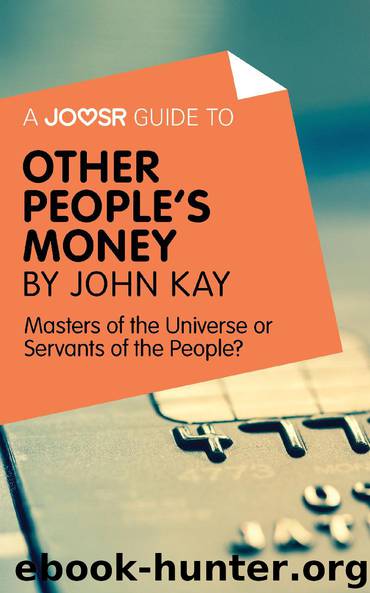Other People’s Money by John Kay

Author:John Kay
Language: eng
Format: epub
Publisher: Joosr Ltd
To successfully change banking practices, we must treat finance like any other industry
If we wish to change the attitudes and actions of bankers, we must change how we view the sector as a whole. Banking has long been seen as not subject to the same rules and expectations as other industries: changing this perception is key to changing banking practices.
Imagine a friend convinced you to let them look after your money, as they felt they could manage it better than you. If they later revealed that they’d lost that money, by lending it to people, exchanging it, or simply gambling at a casino, you’d likely be furious, particularly if you discovered that they hadn’t risked their own money, while still squandering yours. You certainly wouldn’t give them back the money they’d lost, nor would you ask them to manage your money again. And yet this is exactly how government and much of the general public responded after the 2008 financial crisis.
Attitudes toward most industries suggest that they should contribute to the economy and stay afloat without support: if any of their practices are unprofitable and unsustainable without supplements from the taxpayer, then they ought to be stopped. But after the crisis, the financial sector seemed united in the belief not only that they deserved to be bailed out, but also that they should be allowed to continue with business “as usual,” without changing any of their practices. And bizarrely, this view was, by and large, accepted by government and the general public with little question.
A key explanation for this is that modern finance is so complicated and culturally removed from the “real world” that the sector is viewed as being special, untouchable, and able to act with impunity. Unless this perception is challenged and the sector treated like any other industry, then the behavior of bankers is unlikely to change. Refusing to allow any future bailouts of financial institutions would be one way of achieving this. Another method would be to place limits on banks trading primarily within the sector, and insist on a move away from huge multinationals and toward smaller institutions focused on interacting with the “real world” and the “real economy.”
If we, and the government, continue to treat the financial sector as unique and privileged, it will continue to expect such preferential treatment. Refusing future bailouts and insisting that banks return to serving the society they operate in would send a clear message that they cannot get away with their current practices.
Download
This site does not store any files on its server. We only index and link to content provided by other sites. Please contact the content providers to delete copyright contents if any and email us, we'll remove relevant links or contents immediately.
The Secret History by Donna Tartt(16623)
The Social Justice Warrior Handbook by Lisa De Pasquale(11489)
Thirteen Reasons Why by Jay Asher(7788)
This Is How You Lose Her by Junot Diaz(5771)
Weapons of Math Destruction by Cathy O'Neil(5036)
Zero to One by Peter Thiel(4824)
The Myth of the Strong Leader by Archie Brown(4789)
Promise Me, Dad by Joe Biden(4447)
Beartown by Fredrik Backman(4417)
Stone's Rules by Roger Stone(4415)
How Democracies Die by Steven Levitsky & Daniel Ziblatt(4398)
The Fire Next Time by James Baldwin(4342)
100 Deadly Skills by Clint Emerson(4076)
A Higher Loyalty: Truth, Lies, and Leadership by James Comey(4032)
Rise and Kill First by Ronen Bergman(4012)
The David Icke Guide to the Global Conspiracy (and how to end it) by David Icke(3881)
The Farm by Tom Rob Smith(3872)
Secrecy World by Jake Bernstein(3782)
The Doomsday Machine by Daniel Ellsberg(3730)
